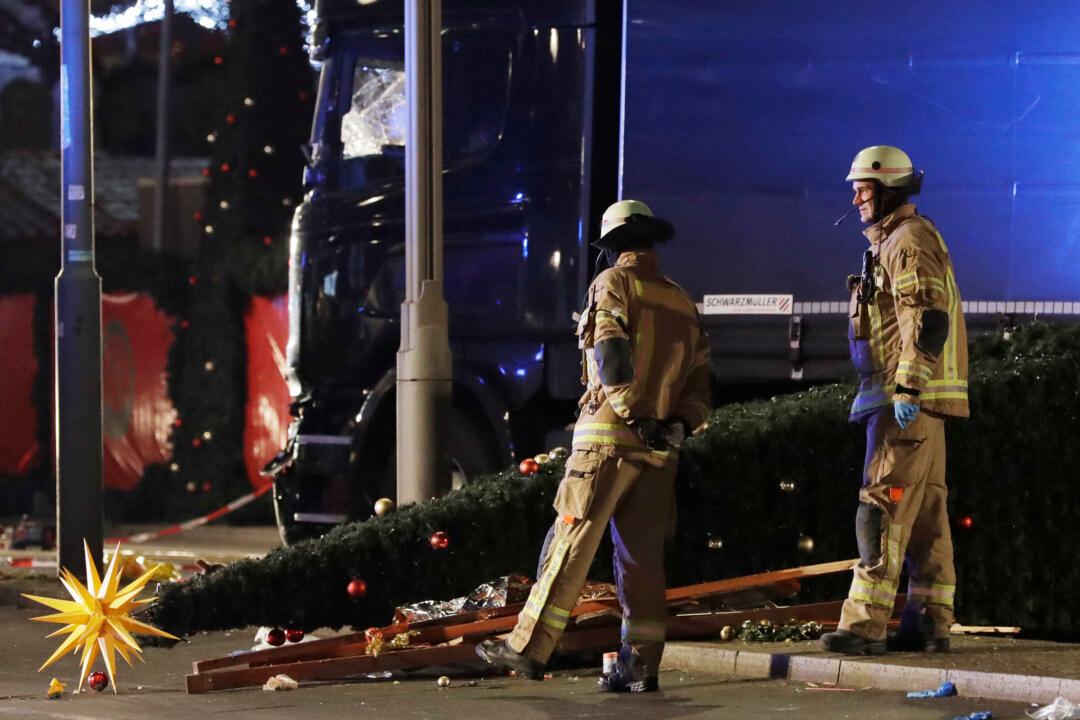BERLIN—Police said Tuesday that the driver who rammed a truck into a crowded Christmas market in the heart of the German capital, killing at least 12 people and injuring nearly 50, did so intentionally and that they are investigating a suspected “terror attack.”
The truck struck the popular Christmas market filled with tourists and locals outside the Kaiser Wilhelm Memorial Church near Berlin’s Zoo station late Monday.
“Our investigators are working on the assumption that the truck was intentionally driven into the crowd at the Christmas market on Breitscheidplatz,” Berlin police said on Twitter.
“All police measures concerning the suspected terror attack at Breitscheidplatz are being taken with great speed and the necessary care,” they said.
Numerous German media reported that the suspect, who was picked up about 2 kilometers (1½ miles) from the crash site, was a Pakistani citizen.
Footage showed the suspect, his head covered in a white sheet, being pushed into a police car shortly after the attack.
Berlin’s public radio station RBB-Inforadio cited security sources saying the man entered Germany on Dec. 31, 2015. News agency dpa, also citing unnamed security sources, said he came to Germany as a refugee in February 2016. Berlin’s Tagesspiegel newspaper reported that the man was known to police for minor crimes.
Police declined to comment on the reports, referring questions to federal prosecutors who said they would hold a news conference Tuesday afternoon.
A spokesman for Berlin’s office for refugee affairs said police conducted a large-scale search overnight at a large shelter for asylum-seekers at the city’s now-defunct Tempelhof airport overnight. Four men in the late 20s were questioned but nobody was arrested, Sascha Langenbach told The Associated Press.
Among the dead was a man in the truck, who succumbed as paramedics treated him, Berlin police spokesman Winfried Wenzel said. Police said later that the man was a Polish national, but didn’t give further details of who he was or what happened to him.
The Polish owner of the truck said he feared the vehicle may have been hijacked. Ariel Zurawski said he last spoke with the driver, his cousin, around noon, and the driver told him he was in Berlin and scheduled to unload Tuesday morning. “They must have done something to my driver,” he told TVN24.
In the immediate aftermath of the attack German officials were cautious in characterizing what had happened. “I don’t want to use the word ‘attack’ yet at the moment, although a lot speaks for it,” Interior Minister Thomas de Maiziere told ARD television late Monday. “There is a psychological effect in the whole country of the choice of words here, and we want to be very, very cautious and operate close to the actual investigation results, not with speculation.”
Germany has not experienced any mass-casualty attacks by Islamic extremists, but has been increasingly wary since two attacks by asylum-seekers in the summer that were claimed by ISIS. Five people were wounded in an ax rampage on a train near Wuerzburg and 15 in a bombing outside a bar in Ansbach, both in the southern state of Bavaria. Both attackers were killed.
Those attacks, and two others unrelated to Islamic extremism in the same weeklong period, contributed to tensions in Germany over the arrival last year of 890,000 migrants.
Far-right groups and a nationalist party seized on Monday’s attack, blaming German Chancellor Angela Merkel for what had happened.
“Under the cloak of helping people Merkel has completely surrendered our domestic security,” Frauke Petry, the co-chairwoman of the Alternative for Germany party, wrote.
Manfred Weber, a member of Merkel’s conservative party and leader of the European Parliament’s biggest political grouping, cautioned against sweeping verdicts but said it was important to ensure that extremists didn’t enter the country.
“The state must be able to check every refugee who comes here,” he told German public broadcaster ARD.
French Interior Minister Bruno Le Roux expressed his sympathy after the attack.
“We are all Berliners today,” he told Europe-1 radio Tuesday. “In this type of situation, we need unity to face down terrorists, and on this occasion we need European unity. It must be strong, particularly strong.”
The White House condemned “what appears to have been a terrorist attack.” It came less than a month after the U.S. State Department warned that extremist groups including Islamic State and al-Qaida were focusing “on the upcoming holiday season and associated events” in Europe.
The ISIS terrorist group and al-Qaida have both called on followers to use trucks in particular to attack crowds. On July 14, a truck plowed into Bastille Day revelers in the southern French city of Nice, killing 86 people. ISIS claimed responsibility for that attack, which was carried out by a Tunisian living in France.
Federal prosecutors, who handle terrorism cases, took over the investigation, according to German Justice Minister Heiko Maas. In Washington, White House National Security Council spokesman Ned Price said the United States was ready to help in the investigation and response.
U.S. President-elect Donald Trump Islamic extremists must be “eradicated from the face of the earth” and pledged to carry out that mission with all “freedom-loving partners.”
Berlin’s mayor, Michael Mueller, planned to hold a news conference on the attack at 1 p.m. (1200 GMT). The archbishop of Berlin, Heiner Koch, said he would hold prayers for the victims at the St. Hedwig Cathedral at noon.





